Brazilian Bear and Panda League
Russia and China in the Brazilian arms market
The military doctrines of Latin American countries have changed significantly in recent years, and now the states of the region are counting on the maximum diversification of military equipment purchases, not wanting to be completely dependent on military products of the United States and Europe. Military budgets are also gaining momentum. According to the Stockholm Peace Research Institute (SIPRI), Latin American countries in the period from 2009 to 2013. increased spending on arms purchases by 10%. Largest importer weapons became Brazil. At the same time, export to this country, which is focused on obtaining advanced technologies for its own development, attracts potential sellers from around the world. And here Russia and China play in the same league.
In the current geopolitical situation, even the most capacious, in terms of military budgets, the Latin American market is one of the most promising for Russia.
At the same time, the growing scientific and technical potential, the heightened political weight and military power of China are forcing him to actively search for new markets for his military products. China, like Russia, mainly focuses on developing countries in Asia, Africa and Latin America.
China, like Russia, mainly focuses on developing countries in Asia, Africa and Latin America.
Russia, according to SIPRI expert Simon Wesemann, is interested in working with Latin America due to the recent loss of markets in a number of countries and problems with its key partners in military-technical cooperation.
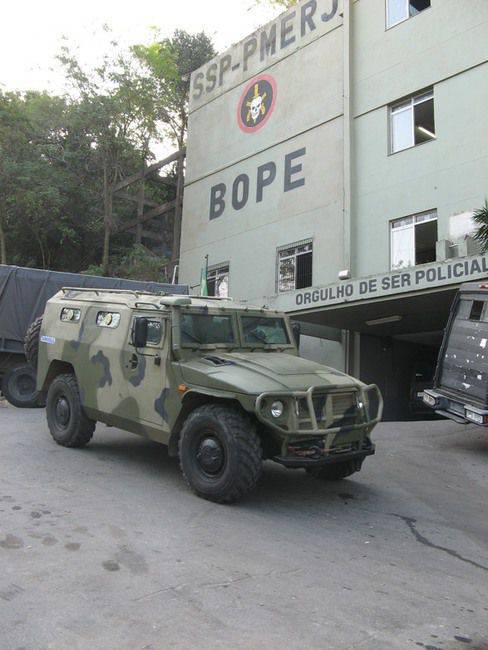
Brazilian special forces equipped
Russian armored vehicles "Tigr"
Russia is already playing an active role in the Latin American arms market, which cannot be said about China. The PRC, which previously sold fairly dubious copies of Soviet weapons on the world market, managed to grow into the largest supplier, taking in 2013 year, according to SIPRI, the fourth largest weapon trade in the world (7,4 billion dollars). Meanwhile, as most of Russia's arms exports were until recently located in the China-India-Algeria triangle, China mainly sold weapons to Pakistan, Bangladesh and Myanmar. Now China without haste, as it increases its technological and scientific success, enters new markets. China has a major advantage in the form of economic diversification and the volume of relations, including in Latin America.
“By allocating large funds for the development and modernization of enterprises and industries, the Chinese authorities are trying, step by step, to dominate the relatively new market. As a result, China will tie these countries to itself, as one of the most developed economies in the world always needs a lot of resources.” [1]. To illustrate these words, suffice it to say that from 2000 to 2009. trade between China and Latin America increased by 1200%. Now China’s trade with the region is 261 billion dollars, but the leadership of the Middle Kingdom does not intend to stop there. In early January, 2015 Mr. Xi Jinping urged to double this figure in the next 10 years. And among the sources of growth not in last place is mentioned the cooperation in the field of high technologies.
Brazil: promising outsiders
The PRC, which previously sold fairly dubious copies of Soviet weapons on the world market, managed to grow into the largest supplier, taking in 2013 year, according to SIPRI, the fourth largest weapon trade in the world.
The South American giant stands out for its size not only on geographical maps: in recent years, Brazil’s economic and political weight has been steadily growing in world politics, which implies strengthening the armed forces, if possible, based on its own technologies. The country's defense spending grew by 7% per year from 2003 and peaked in 2010, after which a gradual decline began. Nevertheless, between 2009 and 2013, arms imports to this country grew by 65% compared to 2004-2008.
2009 to 2013 the country has decided on a tender for the purchase of fourth-generation fighter jets (4,8 billion dollars will go to the Swedish Saab corporation); ordered one nuclear submarine and 4 diesel in France (program cost - 9,7 billion dollars); established jointly with the Italian Iveco production of armored personnel carriers "Guarani" (contract for 3,6 billion dollars). All the largest Brazilian contracts passed by Russia and China. However, cooperation with the BRICS partners in these years also developed, albeit without such loud successes as with the EU countries.
2008 to 2013 Brazil purchased weapons from Russia for 306 million dollars. Most of this amount came from the contract for the supply of 12 helicopters Mi-35 (150 million), Igla-S MANPADS and a small batch of armored vehicles Tigr. Before 2008, Russia supplied only Igla MANPADs to the country: the first contract was concluded in 1994, then another - in 2002. Activation of relations between the two countries began in 2008, after signing a new agreement on military-technical cooperation. Since then, the parties have had time to discuss a lot of opportunities for the development of cooperation, which, however, they are not in a hurry to put into practice.
For example, during a visit to Moscow in December of 2012 by Brazilian President Dilma Rousseff and the Chief of Staff between the countries, memorandums of intent were signed to create a joint venture for assembling Mi-171 helicopters in Brazil and a technical center for servicing Mi-35 helicopters. Also, the Brazilian side declared its interest in acquiring short-range Pantsir-C 1 air defense systems along with the technologies for their production. According to information leaked to the media, the value of contracts could reach 1 billion dollars. And in October 2013 of the year was followed by a memorandum between the Ministry of Defense of Brazil and Rosoboronexport, but since then the contracts for the supply of the Shell-С1 have not been concluded. As far as can be judged by information from open sources, the hitch in promoting this transaction is in the transfer of technology and their value. The fact is that Brazil would like not only to produce air defense systems on its territory, but also to sell them to other countries, which threatens the commercial interests of Russian suppliers.
demonstrated training starts
"Pantsir-С1"
Meanwhile, the Russian Irkut was in talks with Mectron about the possible installation of the Brazilian radar Scipio-01 for export modifications of the Yak-130 training aircraft. Some hopes for the development of military-technical cooperation appeared in 2015. As expected, the contract for the supply of 18 machines (three batteries) ZRPK "Pantsir-S 1" will still be signed. This was stated by the Ambassador of Brazil to Russia Antonio Jose Vallim Guerreiro, noting that "negotiations are in the final stage." In December, Brazilian specialists visited 2014 in Russia, who, according to media reports from this country, were to "finally resolve all production and logistics issues." In addition, it was about buying two batteries of the Igla complex and upgrading the existing ones (a contract worth 14 million dollars). The Brazilian military was shown training launches of the Pantsir-С1 at the training ground, where training targets were struck in their presence. Apparently, negotiations are progressing successfully, and the conclusion of a contract can be expected during the LAAD-2015 arms exhibition, which will be held in Rio de Janeiro from 14 to 17 in April of 2015. Moreover, the Russian side made some concessions: as it became known in February 2015, in Brazil, the production of “some elements” for the Pantsir-С1 system could be arranged.
In addition to the expected successes in the field of air defense, the Russian defense industry finally got the opportunity to disrupt large aviation jackpot. Source of this joyful news The same ambassador, Antonio Guerreiro, said in an interview with Russian media in late January that the delegation of his country's defense had visited Russia “to get acquainted with the models of the latest generation of combat helicopters.” This can be understood as either Mi-28 or Ka-50 (or Ka-52) can take part in the Brazilian tender for the purchase of modern attack helicopters.
Apparently, the ambassador had in mind the visit to Russia of 2014 of the year to Russia by technicians and pilots of the Air Forces of the South American country, during which they were shown Mi-28НЭ. At the same time, the Ka-50 (or Ka-52) helicopter, which is also tipped for sale to Brazil, according to the media of this country, was not even represented by the Russian side.
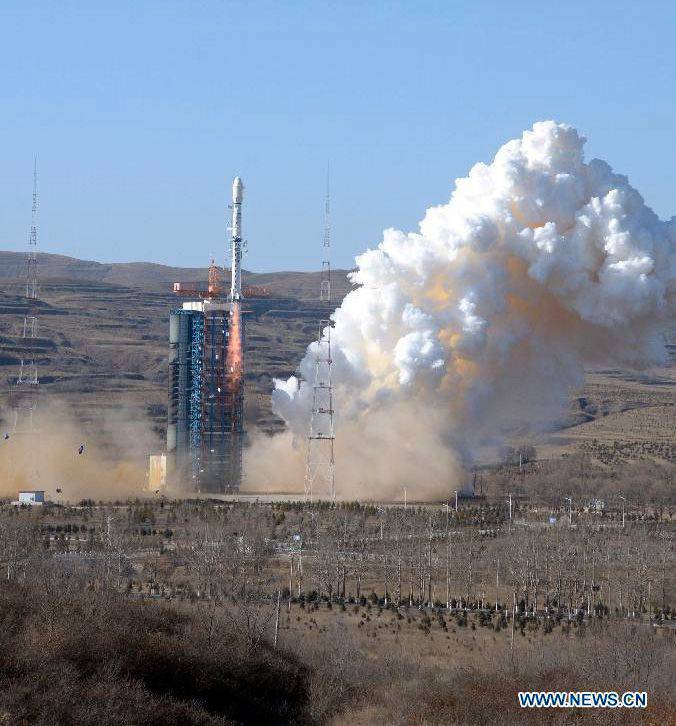
Long March launch vehicle 4B with
Brazilian-Chinese companions
CBERS 4
Russia seems to be working on the bugs and learning to negotiate with Brazilian partners who are not always satisfied with the Russian service. At the beginning of February 2015, the news came that the holding "Helicopters of Russia" intends to open a Mi-2016М service center in Brazil in 35. In addition, as Anatoly Punchuk, Deputy Director of the Federal Service for Military-Technical Cooperation, said in the autumn of 2014, the possibility of joint development of military products with Brazil and South Africa is being considered.
Meanwhile, China in the arms market in Brazil has nothing to boast, even against the background of Russia's very modest successes. In the assets of the PRC - long-standing bilateral ties, almost forty years story cooperation in the field of nuclear technology and a joint program on space exploration, which is actively developing and as part of which five CBERS satellites have already been put into Earth orbit (the last 7 of December 2014). Each such device carries four cameras for monitoring natural resources in Brazil, China and South America. At the moment, countries are preparing a large cooperation agreement on space exploration for a period of 10 years; at the end of 2014, they signed a memorandum of intent on this. The technological partnership of the two countries received additional impetus after signing at the BRICS summit in Fortaleza in 2014 agreements on cooperation in the development of electronic communication systems and security systems to protect land and sea borders.
A major success of China was the order to build the oceanographic vessel Vital de Oliveira for the Brazilian navy. The ship, equipped with sophisticated research equipment in the South Atlantic, was transferred to Brazil in March 2015. The contract amount was about 52 million dollars.
The Chinese gun giant NORINCO announced its participation in a tender for the supply of a turret with a 105 mm caliber gun for an armored personnel carrier with a wheel formula 8x8. Development is scheduled to begin in 2015.
The absence of major military contacts between Brazil and China should not be misleading. China is simply not in a hurry, preferring to develop relations in fundamental areas. Brazil's trade turnover with China in 2013 amounted to 90 billion dollars, and for example, with Russia - just 413,7 million.
A major success of China was the order
on building oceanographic
Vital de Oliveira for the Brazilian Navy
Russia and China play in Brazil not so much in different weight categories, as in different time perspectives. As in many other respects, Beijing systematically creates a situation of interdependence, considering military-technical cooperation as part of an overall strategy in the region and by no means seeking to actively share technologies. Russia currently has a lot more offers on the Brazilian market. The contract for the purchase of ZRPK "Pantsir-С1" has to cooperate on "large" air defense systems like C-300. Interest in Russian helicopters can grow into large contracts in the future, and there is much to offer in the development of the Russian Navy. However, so far all these opportunities have been used extremely poorly. Even the implementation of projects already on the table is delayed. Perhaps the limiting factor is the intention of Brazil, albeit for good money, but to get the maximum of technology from Russia, and with the condition of their re-export. At the same time, cooperation with Russia in fundamental areas and the development of fundamentally new technologies is not attractive for Brazilians. The most striking episode in this regard is the highly evasive reaction of the Brazilian side to Russia's proposal to take part in the project to create the fifth generation PAK FA aircraft.
Bear and Panda in the Caribbean
But the window of opportunity for Russia in this area is still open. First of all, it concerns the intentions declared by the Brazilian government to ensure the protection of natural resources in the Amazon jungle and coastal oil fields. Brazil intends to seriously modernize its air defense and naval forces, and here Moscow, unlike Beijing, which itself purchases some air defense systems in Russia, has something to offer now. However, this window can also close. Suffice it to recall how, in 2013, China bypassed Russia in a tender for the supply of air defense systems to Turkey, which preferred to buy Chinese HQ-9 / FD-2000.
According to the company ASD Reports, Brazil’s defense spending will reach 2020 billion by the year 41,1. At the moment, the country's military budget is already 37,1 billion. And there will be something to fight for. The litmus test for the development of military-technical cooperation and bilateral relations as a whole will be the largest regional review of the MIC forces - the LAAD-2015 arms exhibition, which starts in Brazil on April 14. By the level of the delegation that will go to this South American country, and by the number of full-scale samples on the Russian stand, it will be possible to understand how serious the leadership of the Russian military industrial complex is and what deals we can expect in the near future.
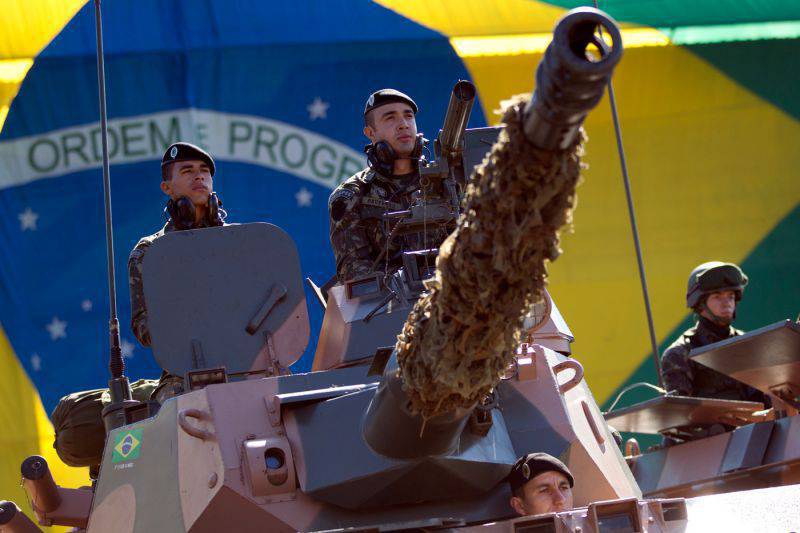
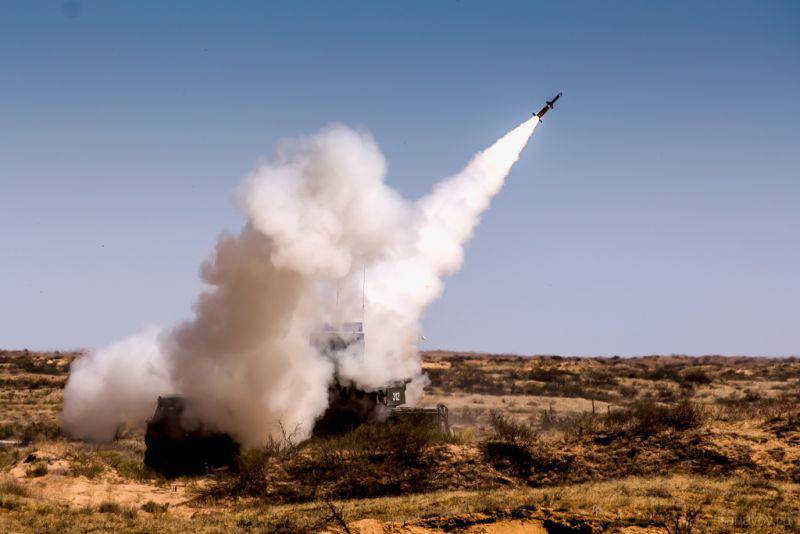
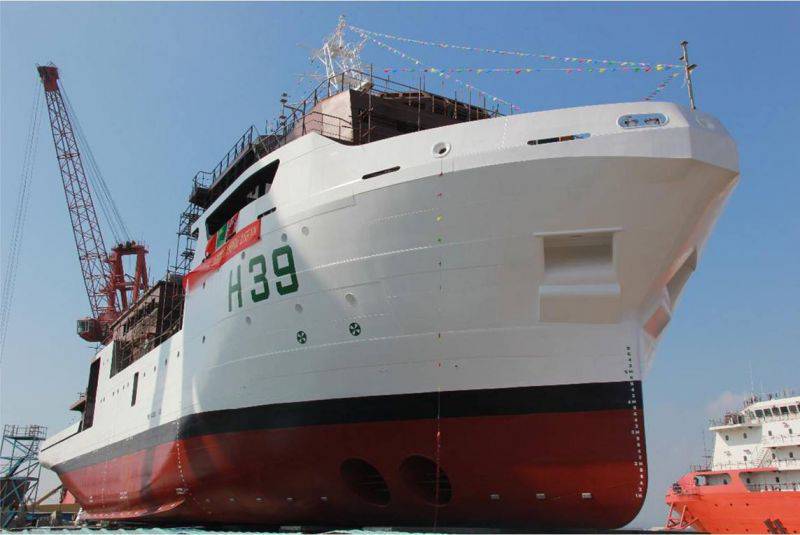
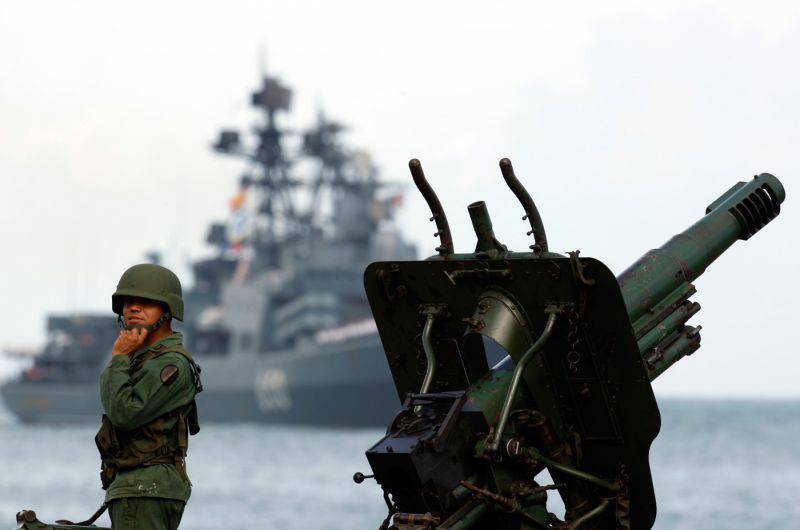
Information